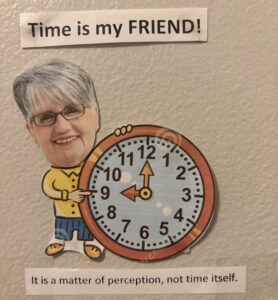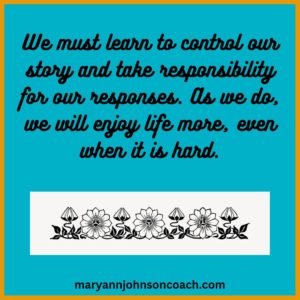 Two weeks ago, in the article Effective Family Systems, I mentioned I overcame yelling by devising a simple system. It worked, but it took ten years of practice. That’s a long time, but I had few resources. We didn’t have computers when I began the process; that left books, if you knew what to read, or friends, if you had any who weren’t also yelling. Fortunately, I had one of those, and she gave me great ideas.
Two weeks ago, in the article Effective Family Systems, I mentioned I overcame yelling by devising a simple system. It worked, but it took ten years of practice. That’s a long time, but I had few resources. We didn’t have computers when I began the process; that left books, if you knew what to read, or friends, if you had any who weren’t also yelling. Fortunately, I had one of those, and she gave me great ideas.
It’s been over three decades since I stopped yelling, so it was worth the time it took to get a handle on it. That isn’t to say that I don’t occasionally lose it. Of course, I do, because I’m human. However, yelling is no longer my go-to method for handling problems.
This topic of remaining in control of our responses to deal better with family issues came up frequently when I was mentoring mothers and fathers. Recently, while rereading articles I had written years ago, I ran across one with a note I received from a mom who wondered how to do what I had done. Here’s what she asked:
“I wanted to thank you again for a great class. I wondered if you could tell me more about the yelling you used to do. I grew up in that type of household, and swore I would never be like that… but guess what, I do? I’d love to hear how you mastered that part of your life. I didn’t do it when I only had 1 or 2 children and they were little. But the more children that came and the older they got, the more I slipped into it. Do you mind sharing what helped you?”
I answered her privately, and we had several wonderful conversations. She found it helpful, and I knew it could benefit others. So, in May of 2011, right around Mother’s Day, I published what I had learned and practiced, and what I shared with her. This was a perfect topic for a day that is hard for many women because they aren’t perfect in this arena. I was one of those back in the yelling days.
What I shared with this sincere mother in 2011 is worth sharing again in 2025 because we have new moms, older mothers, and grandmothers who still struggle with using yelling to deal with family problems. So here goes. Enjoy, learn, and if needed, implement.
How to Stop Yelling – Ten Tips
After reading this mother’s note, does it remind you of you? I’ve received several emails like the one above. Many of us have a difficult time working out our frustration without yelling at our children. I’m certainly no expert on this. However, I used to yell and now I don’t. I can share some things that helped me get a handle on my ability to respond more calmly in the face of frustration and even anger.
1. You can’t just say you’re going to stop yelling. You must have a mental plan about what to do instead. You can’t replace something with nothing. This was the beginning of my simple system.
2. Be sure you’re not secretly frustrated or angry at your husband. When we don’t deal with the sticky parts of our marriage relationship, it can cause anger and resentment. Being in this state, even if you aren’t consciously aware of it, can lead to yelling at your children, because it’s safer and easier than yelling at a spouse. I’ve read this in books, and it was taught in a class I attended many years after I conquered my yelling habit. Your marriage relationship will affect how you manage your children.
3. See your children as people, not as problems, interruptions, etc. See them as people with needs. For example, when my 3-year-old grandson was being a pill, his mom would stop, get down to his level, and say, “What’s wrong, little son?” When I watched her, I knew she was ticked off, but chose to respond in a kind and respectful way. It’s part of her system for managing frustration. It’s a decision she has made and practices. She knows if her kids are crying, misbehaving, hitting, fighting, etc., there’s a problem that needs to be addressed. Although it isn’t easy, it has become a habit for her, and she does it most of the time.
For example, when my 3-year-old grandson was being a pill, his mom would stop, get down to his level, and say, “What’s wrong, little son?” When I watched her, I knew she was ticked off, but chose to respond in a kind and respectful way. It’s part of her system for managing frustration. It’s a decision she has made and practices. She knows if her kids are crying, misbehaving, hitting, fighting, etc., there’s a problem that needs to be addressed. Although it isn’t easy, it has become a habit for her, and she does it most of the time.
4. Practice being present. Parents who are present are better able to STOP and look at a situation and see it for what it is. The better we focus on another person and not on our need to ‘move on’ to the next thing, the better we can handle frustration, disappointment, and anger. P.S. Being engrossed in technology can be a real issue. So, STOP using it, put it down, turn away, and focus on your child.
5. Learn to manage stress. There are as many ways to do this as there are people, and you could fill a library with the books written on the subject. I’ve written several articles on this topic. I used to take hot baths at night and read. I outgrew that stress reliever. Now I shower and pray because I can fit that in, and a bath requires more time than I can give. I also utilize mini meditations that I learned from the book “Eight Minute Meditation” by Victor Davich. Very helpful.
6. Get enough sleep and eat right. Moms really mess this one up. We stay up late trying to get it all done or give ourselves alone time, and then struggle to manage our frustration the next day because we’re tired. Get on a reasonable sleep schedule. Our patience is more easily strained when we aren’t. We also eat over the sink, in the car, anywhere but at the table, sitting down and resting. Learn to eat sitting down, even if you only get five minutes.
7. Stop over-scheduling yourself and your family. Simplify your life.
8. Pray. I consider this the most important point of all! Prayer is the best medicine for anger and yelling. You can feel peace, a greater desire to be kind, and a sense of hope that you can become calm and collected most of the time.
9. Believe that you can be a calm person. What we believe is much easier to accomplish. It took me many years to believe that I could change, that yelling wasn’t in my blood, or that it wasn’t how we Cazier’s handled things. Today, I have an affirmation I say daily to help me ‘believe’ that what I want is what I can be or have.
10. Focus on when you do well. What we focus on, we get more of. When you fall off the wagon and yell, say you’re sorry, forgive yourself, and move on; stop ruminating over it, telling others about it, berating yourself, or beating yourself up for failing. Stop cementing in your mind that you are a “yeller”. What you are is a student learning to be calm. Focus on that!



 One evening, my husband Don was watching Sci-Fi on TV. I was cooking and could hear it. A man said to a woman, “To heal your wounds, you must see the past clearly.”
One evening, my husband Don was watching Sci-Fi on TV. I was cooking and could hear it. A man said to a woman, “To heal your wounds, you must see the past clearly.” where I live in our four-generation home, for over a year. It’s been nice to have his presence and help. We have all benefited, including Seth. His reason for coming here, from Montana, which he loves, was to take a series of classes to help him do some healing work. You see, no one’s past is trauma-free. It is the bag thing. : )
where I live in our four-generation home, for over a year. It’s been nice to have his presence and help. We have all benefited, including Seth. His reason for coming here, from Montana, which he loves, was to take a series of classes to help him do some healing work. You see, no one’s past is trauma-free. It is the bag thing. : )

 I’ve been journaling for decades. I don’t write every day or even every week. Some years I am more consistent than others. But I have recorded many experiences over the years, that were meaningful and taught me something valuable.
I’ve been journaling for decades. I don’t write every day or even every week. Some years I am more consistent than others. But I have recorded many experiences over the years, that were meaningful and taught me something valuable.
 When I lived in Montana with seven children, I was a busy mother. You’re smiling because you know exactly what I mean. A family, regardless of its size, is a handful; lots of cooking, laundry, cleaning, driving people here and there, and so forth. I look back and wonder how in the world I did it all.
When I lived in Montana with seven children, I was a busy mother. You’re smiling because you know exactly what I mean. A family, regardless of its size, is a handful; lots of cooking, laundry, cleaning, driving people here and there, and so forth. I look back and wonder how in the world I did it all.
 In 2003, my world turned upside down when my daughter, Jenny, was hit head-on by a drunk driver going the wrong way on a California freeway. Five years later, I wrote an article about Jenny’s journey and how she turned a major head injury into a life worth living. Another eleven years have passed, and I have watched my daughter live these words – You are what you think about and focus on.
In 2003, my world turned upside down when my daughter, Jenny, was hit head-on by a drunk driver going the wrong way on a California freeway. Five years later, I wrote an article about Jenny’s journey and how she turned a major head injury into a life worth living. Another eleven years have passed, and I have watched my daughter live these words – You are what you think about and focus on.
 Today, although there are things I could share that would be less time-consuming to write and less emotionally draining, I am telling you about my morning. I am sharing this experience for a reason. After several decades of working on two principles, they can still trip me up. They are also stumbling blocks for many moms I talk with. I have written about them often, and I don’t want to beat a dead horse, but this is pivotal for our happiness and our ability to parent and relationship well.
Today, although there are things I could share that would be less time-consuming to write and less emotionally draining, I am telling you about my morning. I am sharing this experience for a reason. After several decades of working on two principles, they can still trip me up. They are also stumbling blocks for many moms I talk with. I have written about them often, and I don’t want to beat a dead horse, but this is pivotal for our happiness and our ability to parent and relationship well.


 I received a call from my sister, Rozanne. She was giving me an update on a difficult situation in her life. It was such a profound example of taking responsibility for your responses and choosing to let go of suffering, I asked her if I could share the experience with you.
I received a call from my sister, Rozanne. She was giving me an update on a difficult situation in her life. It was such a profound example of taking responsibility for your responses and choosing to let go of suffering, I asked her if I could share the experience with you.
 Yesterday, after an hour’s drive, I spent the day helping a friend clean and organize her garage. Wow, it was a hot day, punctuated by a downpour, in the afternoon. I got to work with her sons which was a treat. They did good. : )
Yesterday, after an hour’s drive, I spent the day helping a friend clean and organize her garage. Wow, it was a hot day, punctuated by a downpour, in the afternoon. I got to work with her sons which was a treat. They did good. : )